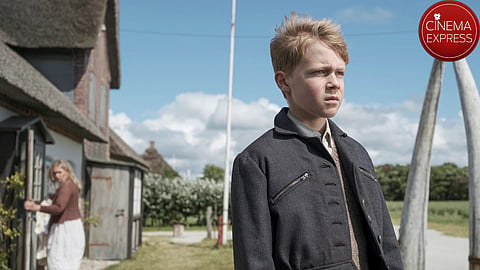

Be it Short Sharp Shock, The Edge of Heaven, Soul Kitchen or In the Fade, Fatih Akin, the prolific German filmmaker of Turkish descent, is best known for films that explore immigrant lives. With his latest, Amrum, he ventures into the new zone of period drama. A moving documentation of what it is like growing up in a beautiful place—Amrum Island in Germany—but at a treacherous point in history—towards the end of World War II, it nonetheless engages with the contemporary issues of identity and belonging and rings an obviously discernible political bell. What is of the times comes with a timelessness attached. Political indoctrination of the young, after all, is as much a thing of the past as it is of the present and the future.
The story is told from one such child’s perspective. The protagonist, 12-year-old Nanning (Jasper Billerbeck), is a man in the body of a boy, whose life is not about fun and games but arduous jobs—working on the farm, fishing, hunting for rabbits and being the bait in the dangerous chase for killing a seal—all to help his mother Hille (Laura Tonke) bring food to the table for the family. Will the end of the war, the death of Hitler and a return to peace change things for them? Or will normalcy still remain a distant dream? What is normal anyhow what with the pregnant Hille mourning the fall of Hitler and Nanning, brought up in the midst of Nazis, unable to let go of the “Hail Hitler” salutation even while encountering an increase in animosity for those with his political inclination. The unlikely clincher in this momentous time is the family secret that Nanning unwittingly unearths, which further ruptures his already broken reality.
The film, which is co-written by Akin with Hark Bohm, is based on Bohm’s own childhood memories of Amrum. It had its world premiere at the official Cannes Premiere section of the Cannes Film Festival marking Akin’s fifth selection at the event. Akin changes course stylistically. Unlike his signature lush and vigorous narratives, things get quieter and centred, simple and subdued. The lilting quality of the frames and the rhythmic flow of story-telling is offset by the weightiness and intensity at the heart of the tale.
The writing is replete with a sense of mystery and impending doom with the soundtrack adding to the inscrutability. The panoramic, grand vistas of the island (framed by cinematographer Karl Walter Lindenlaub) parallel the amazing landscape and contours of the emotive face of Nanning. The paradise isn’t quite that idyllic as it appears to the eye and the young, far from being carefree and reckless, have to constantly confront ideology and politics with all the inner passion and/or a spirit of resistance. The standout sequence, at the core of the narrative, is Nanning’s epic journey across the island to fetch flour, butter and honey—basic necessities that have become luxuries—for his mother who only wants to eat white bread while she mourns Hitler’s passing. Diane Kruger collaborates with Akin again after In the Fade as a Hitler hating farm owner Tessa, the rare voice of rationality and righteousness. However, it’s Billerbeck’s show all the way. He is stunningly cast and performs the complex role with great finesse that belies his age.
Amrum could remind some of Taika Waititi's Jojo Rabbit because of the Hitler Youth member kid as the central figure. But Akin is far from jokey in his approach. He is pertinent without being provocative, and compelling without getting confrontational. Perhaps the artistic approach that works best in our times. He fashions a tender coming-of-age film that steers clear of the sappy and the showy and touches a chord with both a sense of loss for and hope in a child’s innocence. At the end of the day human integrity, and its persistence against all odds, will remain the surefire cure-all for the several ills of the world.